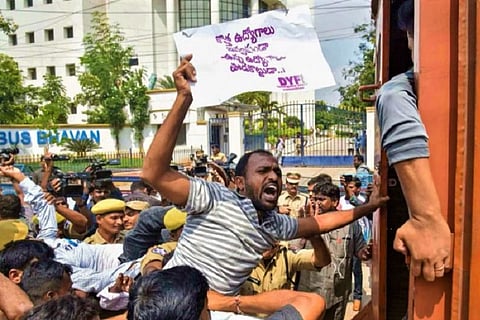

"You are playing with fire, and it's your hands that will burn. We will lose nothing. People of Telangana aren't scared of arrests, lathis and bullets. If you go ahead like this, there will be serious consequences. I'm warning the Chief Minister and the DGP.”
These were the words uttered by Telangana Rashtra Samithi (TRS) President K Chandrasekhar Rao during the peak of the agitation for separate statehood, when employees of the Road Transport Corporation (RTC) went on strike in support of the cause. Ironically, in 2019, it seems that this is the exact advice that CM KCR himself should listen to.
More than 48,000 employees have been on strike for over a month, demanding better wages, regulated working conditions and payment of dues, among other things. The strike, has resulted in chaos, throwing public transport in the state out of gear.
With the government refusing to step back, on Wednesday, the Joint Action Committee (JAC) of the unions announced that they're ready to call off the 47-day-old indefinite strike, if the government allows them to resume duties without any precondition.
With this statement, the ball is now in KCR's court but the CM seems to be least bothered to take the employees back, let alone fulfil the 26 demands that the unions have put forth.
Frustrated by the deadlock, more than 20 people have died. Several have killed themselves while a few died of stroke, according to RTC unions, and this has raised several questions.
The employees offering to call off their strike was not without precedent. Just days earlier, they had dropped their main demand of merging the TSRTC with the government, which essentially would make them government employees with the same benefits.
The ‘back-down' by RTC employees though, is nothing to celebrate, as it comes out of helplessness.
The employees have not been paid their salaries for over two months and they and their families are heavily in debt.
The Telangana High Court (HC) has also pulled up the state government and the RTC multiple times accusing them of misrepresentation of facts and not caring about the lives of employees and the public.
Despite this, the government has claimed that it's not in a position to afford to pay salaries and has arrogantly blamed the workers of 'blackmailing' to destabilise the government.
Earlier this week, while hearing a plea related to the case, the High Court refused to declare the strike as illegal and asked the Labour court to take a final call. However, the HC stated that it would hear pleas related to privatisation of 5,100 routes, proposed by the state government, and other pleas demanding ex-gratia to the employees who died.
Whose loss is it?
Observers say that the real loss is that of democratic rights as workers demanding better wages were forced to give up their protest. They even failed to get a concrete legal remedy despite the intervention of the High Court. This, analysts say, will only embolden the KCR-led government further.
Palwai Raghavendra, a senior political analyst observed, "Workers are surely standing on a weaker turf and will have to see if they have any more grit left in them to continue the fight."
The depleting financial resources of the families too, has led the employees to have a second thought about keeping the strike going.
It must be noted that KCR had broken his silence on the strike, following his party's clear victory in the Huzurnagar bye-poll and declared that the solution to the deadlock would be to end the RTC itself, and stop unions from forming, forgetting that he used to be a staunch supporter of these same employees who are now protesting against him.
It is absurd and antithetical to the Constitution to call for a complete prohibition of unions, as it assures right to association to its citizens. Ironically, KCR himself is a leader who rose to power thanks to strikes and boycotts that he led and participated in.
As veteran academic and civil rights activist Haragopal pointed out in a recent TV debate while referring to the comment, without unions, it would be difficult for the government to engage in dialogue with its workers. The government's wish to abolish unions completely, just because they don't side with the state in this case, would result in anarchy, nullifying any means for a democratic dialogue.
It's unfortunate that a movement which started for democratic rights is failing without achieving anything concrete.
Palwai Raghavendra says that the phenomenon sets a bitter precedent and adds, "This unfortunate failure of RTC employees, which is such a large group, is a death blow to the smaller groups of employees who may want to protest tomorrow. It will impede the spirit of democratic struggles."
Prof C Ramachandraiah from Centre for Economic and Social Studies (CESS) in Hyderabad also minces no words.
"We as a society, were unmoved by their strike which was for just demands, and have failed. This will have serious implications. There is also lack of a qualitative opposition which can mobilise a considerable chunk of people for a protest or demonstration. It's a failure of the democratic consciousness of the state of Telangana," he says.
"The employees may have expressed willingness to join back their duty, without achieving anything concrete, due to their helplessness, but tomorrow, even if other employees from non-gazetted category or municipal workers face similar problems, surely they won't be treated differently. In fact, the treatment will be more repressive and authoritarian," he adds.
Views expressed are the author’s own.